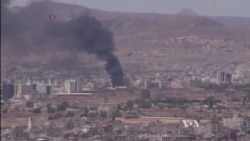U.S. President Barack Obama’s goal at this week’s summit of Gulf Cooperation Council nations near Washington is to improve the way the militaries of the region coordinate with each other in the face of threats like Iran and the Islamic State militant group.
The U.S. leader hopes the gathering will be a historic and visual event showcasing the administration’s steadfast backing of its Gulf partners, some of whom have expressed doubts about the Obama administration’s vision for security in the region, especially with regard to what they perceive as growing threats from Iran.
The announcement that Saudi King Salman will not be attending put a damper on plans for a high-profile show.
Both sides have insisted the cancellation is not a snub, but analysts say it is difficult to ignore the tensions that preceded the announcement.
The Saudi monarchy opposes President Obama’s overtures to Iran, and is skeptical of his efforts to reach an arrangement to prevent Iran from developing nuclear weapons.
The White House said those who are needed to get the business done will be present at the summit, which starts with a dinner at the White House on Wednesday, followed by a day of meetings and photo ops at the presidential retreat at Camp David Thursday.
“This will be an important opportunity for the United States to deepen and modernize our security cooperation with our GCC partners, White House spokesman Josh Earnest told reporters Tuesday. “Much of the conversation will be focused on what these countries can do to better coordinate their own security measures,” Earnest said.
White House officials said the presence of the Saudi king is not necessary to engage in conversations on establishing a missile defense system for the region, or for talking about more joint exercises and weapons sales.
The Saudis, concerned by the ouster of Yemen’s U.S. supported government by Iran-backed Houthi rebels, launched air strikes. While those strikes have the support of the Obama administration, they also have been the subject of criticism in Washington.
Gulf partners coming to the summit say they want to upgrade their security relationship with the United States.
Yousef al Otaiba, the United Arab Emirates ambassador the United States, at a panel discussion in Washington last week, called for a stronger security relationship. “We are looking for some form of security guarantee, given the behavior of Iran in the region; given the rise of the extremist threat.”
He said that threat warrants formalized commitments. “In the past, we have survived with a gentleman’s agreement with the United States about security. I think today, we need something in writing. We need something institutionalized.”
Obama administration officials say that with a military presence that includes 35,000 troops already in the region, there are no large-scale commitments to be made at this summit.
No treaties are to be signed, and with the Saudi king not present, analysts say it is unlikely the summit will go down as a historic new beginning for the U.S.-Gulf partnership.
But U.S. officials hope it will give all sides an opportunity to hear from each other and learn more about their differing visions for their future security.
Human rights activists on Tuesday called on President Obama to press Gulf nations for reforms to improve human rights. White House officials say the topic of human rights, including political freedoms, will be mentioned but will not be a focus of the conversations.





